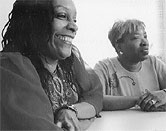 |
 |
|||||
 |
 |
 |
 |
 |
|||||||||
|
Nurses take health education to people at home
Catholic New World staff writer Michelle Martin talks with Shirley White and Greta Brown of Catholic Charities. Registered nurse Shirley White has worked as a Catholic Charities Home Care clinical manager for about 2 years, coordinating the health services her senior citizen patients need to be able to stay in their homes and communities. But this summer, she was awarded the Amerigroup Foundation’s Healthy Hero Award for her work with dozens of asthma patients, mostly children, and their families. There is a need: Chicago leads the nation in the rate of asthma deaths and hospitalizations, with a wide disparity in both the number of cases and their severity between minority and white communities. Starting the Amerigroup asthma program despite working out of Catholic Charities’ Senior Social Services division demonstrates how the agency is able to stretch to find new ways of meeting its mission, said White and her supervisor, Home Care Director Greta Brown.
The Catholic New World: Tell me about the asthma program. Shirley White: It allows us to work with individuals who have Amerigroup insurance who have made repeated emergency room visits with a complaint of asthma. This particular program allows the nurse to go out and do three home visits to educate the parent or the child or the adult with asthma, help them to identify their triggers, do a home environment assessment. I go through the house and try to identify things that could be a trigger to the asthmatic. I look at things like the bedrooms, the mattress, the pillows, the linens, the drapes, the heating system …
TCNW: They must not like it when you visit. SW: They love it, because they’re tired of using the emergency room as their primary source of health care, they’re tired of being woken up in the middle of the night, rushing their child to the emergency room. They’re looking for some answers. Together we try to identify what’s going on. Some things they’re aware of, and some things they’re not aware of. The RN has kind of disappeared from the doctor’s office, and her education function has also been kind of removed from the hospital setting, because they move people through so fast. So these home visits provide personalized care, personalized health education, one on one, and we walk them through the whole thing. We look at the medication. I make sure they’re using their inhalers correctly. The majority of them are not using their inhalers correctly; that’s why they’re not getting any relief. Home visits sometimes entail going with them to the school or to the doctor’s office, to try to get them reconnected with their primary care physician, to get them on right medication, to get them nebulizers, to get them the tools they need. Whatever it takes to get them through the process.
TCNW: What’s the relationship between Catholic Charities and Amerigroup? Greta Brown: Amerigroup contracts with us to provide the service. At first, they were like, “We’ll see how this works out.” But as she has done the home visits, Shirley has identified children with developmental disabilities and helped them get access to the services they need and taken it a lot further. It’s more holistic; it’s not just asthma.
TCNW: Are most of your asthma patients children? SW: The youngest was under 2, and the oldest was in her mid-40s. The majority of them are 10 and above, and that’s the age group I like to deal with.
TCNW: Why? SW: Because they’re anxious to learn about the disease. They’re anxious to conquer asthma. They don’t want to have it, but since they do have it, and they end up in emergency rooms, they want to do something about it. You see the enthusiasm there. Also, with asthma, children have certain characteristics that are common. They tend to be kind of quiet and suffer quietly. If they’re having trouble breathing, they’re not going to tell anyone. They have strong endurance. Part of that’s just growth and development, feeling infallible. But with an asthmatic child, even with their schoolwork, they’ll keep trying. I believe the disease process has taught them something, and they’ll keep hanging on.
TCNW: These young people are a change of pace from most of your clients. What does home care usually entail? GB: We have some of the same problems facing our seniors, with chronic pulmonary diseases or asthma, or with age, diseases that come from social habits and the environment. Most of our clients are senior citizens, but since we are a home health agency, we do reach out to our clients from birth to death.
TCNW: What kinds of services can you provide? GB: Help with basic activities of daily living, such as meal preparation, assistance with bathing, maybe doing some shopping for that person, light housekeeping, laundry. Those kinds of activities keep a person in their community, in their home, and they are able to age in place with dignity. It’s not so much that they’re totally incapacitated. They just need that support.
TCNW: Is this a sign of disconnection from family members, or are family members not available because they are working? GB: This really supports the family members who are primary caregivers. and more, adults are caring for aging parents, and that’s simply because people are living longer. They might be too young to retire, so they need some help so that Mom or Dad can continue at home safely. SW: Or I’ve seen cases where the client is in their 90s, and their children are 70 and have health issues of their own. GB: We’ve had situations like that where they’ve all been clients.
Front Page | Digest | Cardinal | Interview | |
||||||||
